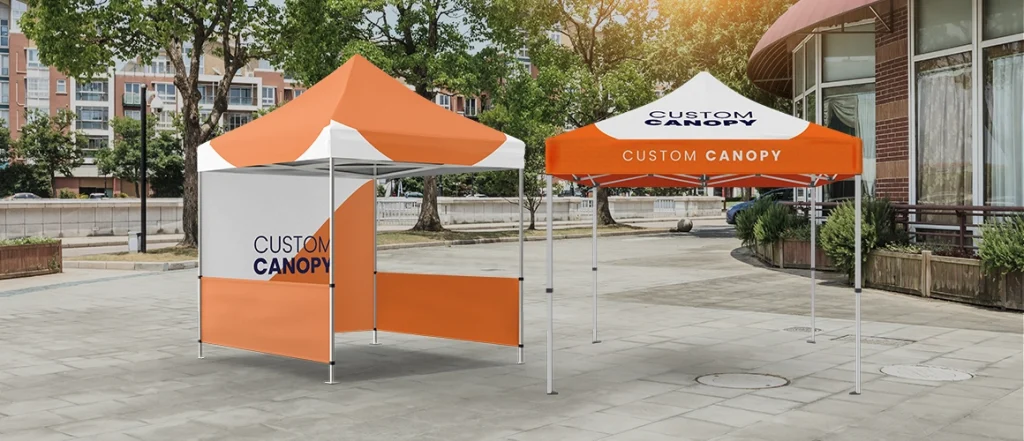A number of important variables should be carefully considered when choosing the ideal bespoke canopy tent for your requirements. Making the correct decision may have a big influence on your experience along with happiness, whether you’re organizing an outdoor event, setting up at a trade fair, or constructing a temporary shelter for business use. In addition to offering the essential weather protection, a well-chosen canopy tent is a useful as well as adaptable option for a range of situations. Let’s examine the five crucial elements that need to direct your choice of custom canopy tent.
1. Size and Space Requirements
Size is arguably the most important aspect of direction that should be considered when choosing a canopy tent. Consider the number of people or things you are supposed to convene within the tent and the extent of the space available at the specific selected site for setting up the tent. In order to guarantee comfortable mobility in addition to enough air circulation, take into account not only the urgent space requirements but also leave some additional space. Take into account any extra furnishings, equipment, or exhibits you may need to set up beneath the cover. Although a larger tent may be more adaptable, keep in mind that it also takes up more room to put up and might be more difficult to move alongside the store. Finding the ideal balance between practical manageability along with having enough room for your needs is crucial.
2. Material Quality and Durability
Your bespoke canopy tent’s lifetime and performance in a variety of weather situations are greatly influenced by the material composition. Because of their increased durability in addition to resilience to wear and tear, high-quality materials may require a larger initial investment, but they frequently end up being more cost-effective over time. Choose textiles that are lightweight enough for easy handling while providing enough water, UV, as well as tear resistance. Equally crucial is the frame material; take into account choices like reinforced steel or aircraft-grade aluminum, which offer strong support alongside are resistant to corrosion and rust. The overall strength along with stability of the tent are directly impacted by the fabric’s denier rating in addition to the thickness of the frame components.
3. Weather Resistance and Seasonal Adaptability
Your bespoke canopy tent must be able to endure a range of weather conditions without losing its structural soundness or protective qualities. Think about the seasons you’ll be using the tent most along with the usual weather patterns in your location. Look for characteristics like UV-resistant coatings to shield the tent’s material in addition to occupants from damaging sun rays, sufficient waterproofing to withstand unexpected rain, along with appropriate ventilation systems to control heat buildup. Proper drainage solutions should be incorporated into the tent’s construction to avoid water buildup on the canopy top, which might cause sagging or even collapse. To adjust to shifting weather conditions, think about whether you need sidewalls or other extras. In order to ensure year-round usage protection, a well-designed tent should provide flexibility in arrangement while retaining stability in a range of weather conditions.
4. Ease of Setup and Portability
When choosing your bespoke canopy tent, it’s important to consider how it will be handled along with being transported. Think about how often you’ll need to erect and dismantle the tent and who will be in charge of doing so. Seek designs with easy-to-follow assembly instructions, components with clear labels, and few tools needed. Important considerations include the weight and packed size of the tent’s components, particularly if you want to move it about a lot. Examine if the tent has a case or storage bag to facilitate easier storage and transit. The packed tent should fit easily in your available storage and transportation space, and the setup procedure should be simple enough for a small crew to do effectively.
5. Cost and Value Considerations
Budgetary restrictions are frequently the most important factor, but it’s crucial to look at the entire cost of ownership rather than simply the purchase price. Think about things like the tent’s anticipated lifespan, upkeep needs, and possible repair expenses. Although higher-quality tents may cost more, they frequently provide better value due to their greater longevity and lower maintenance requirements. The overall cost might be greatly impacted by any extra accessories or customization choices you may require, such as sidewalls, weights, or custom printing. Remember to take into account warranty coverage and post-purchase assistance, since these can offer significant investment protection. The objective is to strike a compromise between the things that offer true value for your particular demands and your financial limitations.
Conclusion
You may choose a custom pop up tents that will efficiently fulfill your demands and offer dependable service for many years to come by carefully weighing these five important considerations. Keep in mind that rather than concentrating just on one of these criteria, the ideal decision frequently entails striking the correct balance between them. Spend some time investigating and contrasting choices, and don’t be afraid to inquire in-depth about the qualities that are most important for your particular use case.

